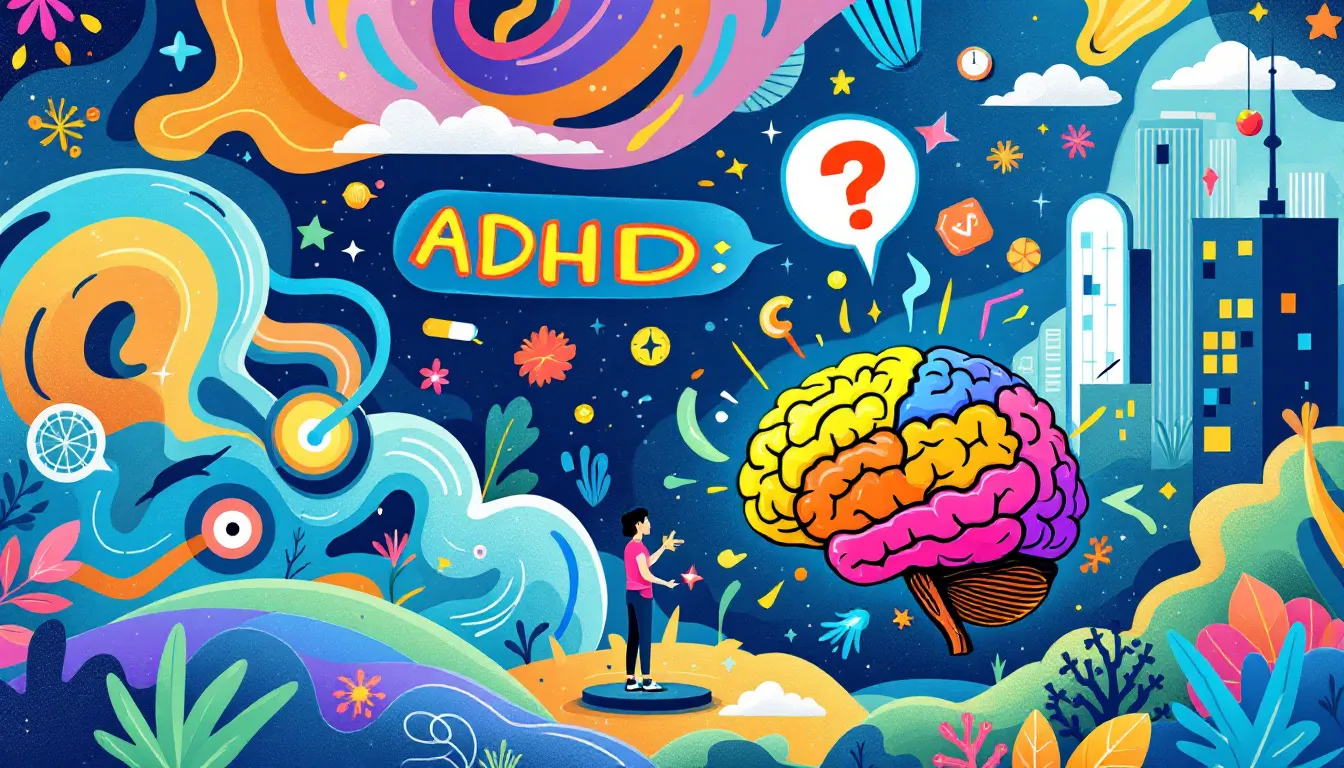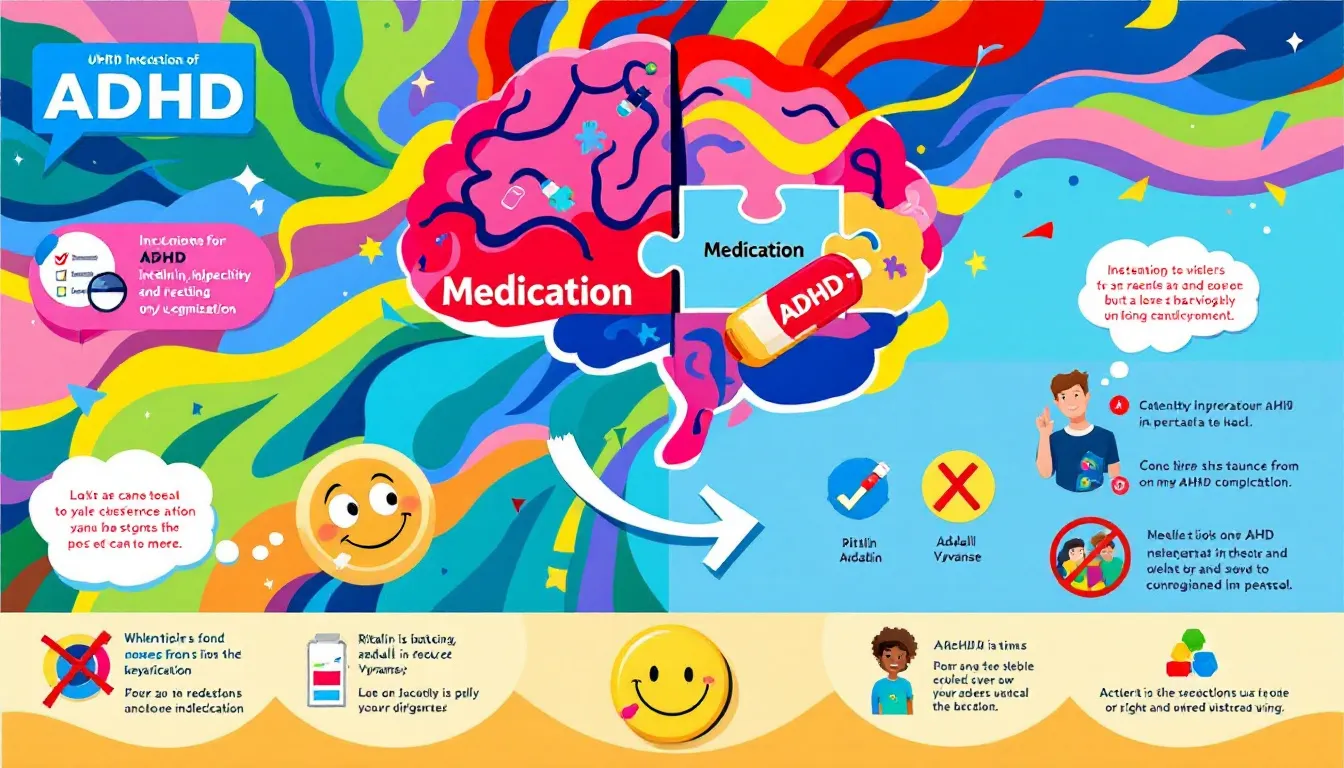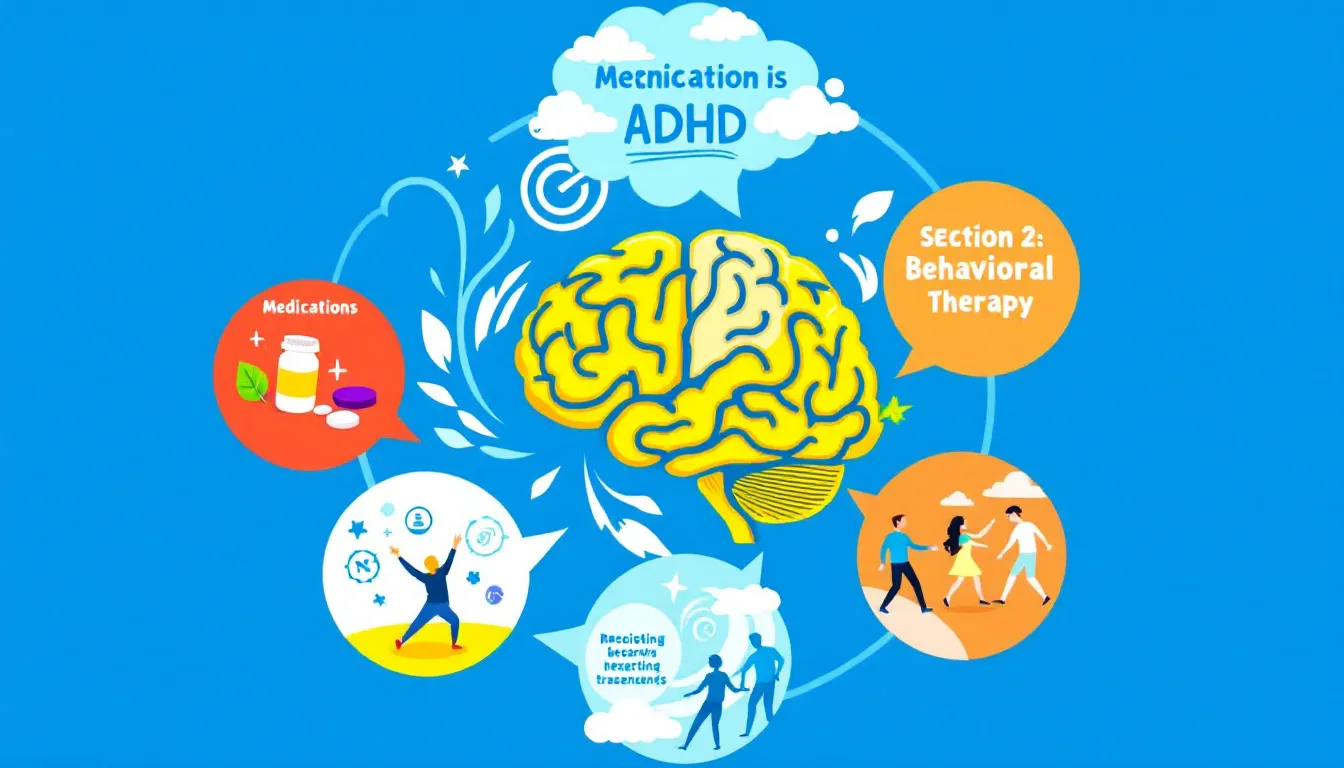The link between ADHD and drugs is concerning. Individuals with ADHD often misuse substances, risking their health. This article delves into the reasons behind this trend, the substances typically involved, and effective ways to manage the issue.
Key Takeaways
- Individuals with ADHD face a significantly higher risk of developing substance use disorders, necessitating integrated treatment strategies.
- Common substances misused by those with ADHD include alcohol, marijuana, and nicotine, often as forms of self-medication for managing symptoms.
- Early intervention, education, and proper management of ADHD medications are crucial in reducing the risk of substance abuse in affected individuals.
The Intersection of ADHD and Substance Use Disorders

The intersection of ADHD and substance use disorders is a complex and often overlooked issue. Estimates suggest that around 23% of adults undergoing treatment for substance use disorders also have ADHD. This high prevalence underscores the need for integrated treatment approaches that address both conditions simultaneously.
Individuals with attention deficit hyperactivity disorder (ADHD) are at a heightened risk for developing substance use disorders throughout their lives. This risk is particularly pronounced when deficit hyperactivity disorder ADHD co-occurs with conduct disorder, a common behavioral issue in children and adolescents. The presence of conduct disorder can exacerbate impulsive behaviors, making substance use more likely.
Moreover, more than 15% of adults with ADHD have abused or were dependent on alcohol or drugs in the past year. These statistics highlight the urgent need for effective strategies to manage ADHD symptoms and reduce the risk of alcohol and substance abuse.
Education is key. It is important to educate children and adolescents with ADHD about the increased risk of substance use disorders. Their caregivers should also be informed as part of this initiative. Understanding this risk can lead to better prevention and intervention strategies, ultimately reducing the likelihood of substance abuse.
Common Drugs Misused by People with ADHD
Identifying the common substances misused by individuals with ADHD is essential for addressing the problem effectively. Alcohol and marijuana top the list of substances commonly abused by adults with ADHD. These substances are often used to self-medicate, providing temporary relief from ADHD symptoms but leading to long-term issues.
Among teens and young adults with ADHD, marijuana is the most commonly used substance. This trend is concerning given the potential for marijuana to negatively impact cognitive function and motivation, which are already areas of difficulty for individuals with ADHD.
Kids with ADHD tend to gravitate towards nicotine, marijuana, and cocaine as a means of self-medication. Nicotine, in particular, is often used to manage symptoms such as impulsivity and inattention, despite its addictive properties and harmful health effects.
Recognizing these patterns of drug use is the first step in developing targeted interventions to help individuals with ADHD avoid illicit drugs and seek healthier coping mechanisms.
Why ADHD Increases the Risk of Substance Abuse
The question of why ADHD increases the risk of substance abuse is multifaceted. Impulsivity and a tendency towards risk-taking are significant factors contributing to substance use disorders among individuals with ADHD. These impulsive actions can lead to risky behaviors, including substance use.
Children diagnosed with ADHD are at an increased risk of early alcohol use, with around 40% starting around 14.9 years old. This early exposure can set the stage for lifelong substance use problems. Research indicates that children with ADHD are two to three times more likely to misuse substances compared to their peers.
Neurobiological factors also play a role. The brain’s reward system in individuals with ADHD may be more sensitive to the effects of substances, increasing the likelihood of developing substance use issues. Environmental factors, such as a family history of addiction, can further exacerbate this risk.
Self-medication is another common strategy among individuals with ADHD. Around 70% of young adults with both ADHD and substance use disorders report using substances to self-medicate. This desire to self-medicate rather than seek a high highlights the need for effective ADHD management.
Adults diagnosed with ADHD are nearly three times more prone to developing substance use disorders compared to those without the condition. The prevalence of substance use disorders in adults with ADHD is approximately 15.2%, significantly higher than the 5.6% seen in the general population. These statistics underline the critical importance of addressing ADHD symptoms to prevent substance abuse and the need for an ADHD diagnosis.
The Role of ADHD Medications in Substance Use Prevention

ADHD medications play a crucial role in substance use prevention. Children with ADHD who begin stimulant treatment earlier tend to have a lower risk of developing substance abuse issues later in life. This early intervention helps manage ADHD symptoms effectively, reducing the need for self-medication.
Long-term studies indicate that ADHD treatment with stimulants does not increase the risk of substance abuse compared to untreated ADHD. This finding dispels the myth that stimulant medications for ADHD are a gateway to substance use disorders.
In fact, research has not found a significant link between prescribed stimulant ADHD medications and the development of substance abuse problems. When used correctly, stimulant medications for ADHD are less likely to lead to addiction compared to street stimulant drugs that also increase dopamine levels.
Proper management and adherence to prescribed ADHD medications can significantly reduce the risk of substance abuse, emphasizing the need to treat ADHD with medical guidance and diligent adherence to treatment plans.
Addressing Co-Morbid Mental Health Issues
Co-occurring mental health disorders, such as anxiety and depression, can amplify the risk of substance abuse among those with ADHD. It’s essential to address these issues concurrently to manage ADHD symptoms effectively and reduce the likelihood of substance use.
Individuals with untreated ADHD are at a higher risk of developing co-occurring mood and anxiety disorders. Managing ADHD effectively may require addressing underlying anxiety or depression, which can otherwise lead to self-medication and substance abuse.
Non-stimulant medications can be a suitable alternative for treating ADHD in adults with a history of substance abuse. These medications can help manage ADHD symptoms without the risk of addiction associated with stimulant medications.
Effective Treatment Strategies for ADHD and Substance Use Disorders

Effective treatment strategies for ADHD and substance use disorders require a holistic approach. Adults with ADHD often experience multiple psychiatric conditions, including substance use disorders, which complicate treatment and worsen outcomes. Integrating ADHD management into substance abuse treatment is crucial, as untreated ADHD can lead to relapse.
Cognitive Behavioral Therapy (CBT) has been suggested to be effective for reducing ADHD symptoms. Motivational Interviewing (MI) assists individuals in resolving ambivalence about their substance use and encourages motivation for positive change.
Family and Couples Therapy can create a supportive environment, crucial for managing ADHD symptoms in adolescents and adults. School-based interventions for adolescents with ADHD can address academic, social, and familial issues that contribute to substance use risk.
Proper medication management is vital due to the risk of misuse, necessitating careful monitoring for those on stimulant medications. Behavioral contracts can outline expected medication use and consequences of misuse, helping to prevent substance abuse.
Early Intervention and Education
Early intervention and education play a critical role in preventing substance abuse among individuals with ADHD. Screening for ADHD symptoms is crucial in patients seeking treatment for substance use disorders, given that ADHD is often underdiagnosed. A thorough assessment of both ADHD and substance use disorders is the initial strategy for treating adolescents with co-occurring conditions. Stabilizing substance use is a crucial first step in this process.
Parents are advised to start talking about ADHD and substance abuse at an early age. Early conversations can foster awareness and prevention, reducing the likelihood of substance use problems later in life.
Support Systems and Relapse Prevention
Support systems are vital for relapse prevention in individuals with ADHD and substance use disorders. Twelve-step programs foster accountability and provide a supportive community, significantly improving the chances of sustained sobriety.
Peer support is crucial in recovery, helping individuals navigate emotional challenges and avoid relapse triggers. Those involved in peer support programs experience a marked reduction in relapse rates compared to those without such support.
Healthy relationships established through support groups can create positive peer pressure, aiding individuals in overcoming addiction. Twelve-step programs can also provide assistance with reminders and transportation, arranged by friends or family members.
Monitoring and Managing Medication Use
Regular follow-ups with healthcare providers are essential for assessing medication effectiveness and adjusting dosages safely. Monitoring ADHD medication use can help detect signs of misuse or dependency early on.
Healthcare providers should actively engage in discussing any concerns regarding medication side effects or effectiveness. This ongoing dialogue ensures that the right medication and dosage are maintained, preventing potential substance abuse problems and helping to address how some individuals may abuse drugs.
Proper management of ADHD medications can reduce the risk of misuse and dependency, emphasizing the importance of regular medical supervision and adherence to prescribed treatment plans.
Summary
In summary, the intersection of ADHD and substance use disorders is a complex but manageable challenge. Understanding the risks, common drugs misused, and reasons for increased substance use among individuals with ADHD is crucial. Effective management strategies, early intervention, and robust support systems can significantly reduce the risk of substance abuse.
By addressing ADHD symptoms, managing co-morbid mental health issues, and ensuring proper medication use, individuals with ADHD can lead healthier, substance-free lives. Empowered with knowledge and practical insights, we can navigate these intertwined issues successfully and inspire positive change.
Frequently Asked Questions
Why are individuals with ADHD at a higher risk for substance abuse?
Individuals with ADHD are at a higher risk for substance abuse primarily due to impulsivity, risk-taking behaviors, and tendencies towards self-medication. These characteristics can lead them to seek out substances as a coping mechanism.
What are the most common drugs misused by people with ADHD?
Individuals with ADHD commonly misuse alcohol, marijuana, nicotine, and cocaine. These substances can exacerbate symptoms and impact overall well-being.
Can ADHD medications help prevent substance abuse?
ADHD medications can help prevent substance abuse by effectively managing symptoms and reducing the urge to self-medicate. This proactive approach lowers the risk of developing substance use disorders.
How can co-occurring mental health issues impact ADHD and substance abuse?
Co-occurring mental health disorders such as anxiety and depression can significantly exacerbate substance abuse risks in individuals with ADHD, highlighting the necessity of simultaneous treatment for both conditions. Addressing these issues together can lead to more effective outcomes.
What role do support systems play in managing ADHD and substance use disorders?
Support systems are crucial in managing ADHD and substance use disorders as they offer accountability, emotional support, and practical assistance, significantly aiding in relapse prevention. Engaging with peers and support groups enhances resilience and coping strategies essential for recovery.
Original content from the Upbility writing team. Reproduction of this article, in whole or in part, without credit to the publisher is prohibited.









